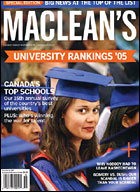25 schools skip Maclean’s

After 16 years, a frustrating task has come to an end. Concordia staff who prepare data for Maclean’s annual rankings of Canadian universities estimate that it took them about 42 person-days, worth between $12,000 and $15,000 annually, to meet the magazine’s demands.
The University of Toronto fired a shot across the bow of Maclean’s on Aug. 14 when it led a revolt of 11 universities against the rankings. Since then, 14 others, including Concordia, have bolted. That leaves 22 who have not — yet.
In a letter to the managing editor of the special issue, the U of T, which has been consistently ranked at or near the top, summarized longstanding objections to the way the survey is done.
While the letter signed by the 11 university presidents praises Maclean’s for its editorial coverage of postsecondary education, it says the rankings are misleading because the data are “compiled in ways that we regard as over-simplified and arbitrary.”
Typically, Maclean’s combines information across a range of categories into a single ranking number. “Consider how such an approach might pervert one’s understanding of a general hospital that is ranked #1 in obstetrics and #10 in cancer care,” the U of T letter said.
The weighting of “variables” used to assess students’ university experience were judged to be of questionable validity, and the presidents noted the low response rate to surveys Maclean’s relies on to rank universities’ reputations.
Concordia’s president, Claude Lajeunesse, wrote his own letter to Maclean’s on Aug. 29 in which he said that over the years that Concordia has participated, its objections and suggestions had fallen on deaf ears.
Lajeunesse said Maclean’s fails to take account of Concordia’s specific context as an English-language institution in Quebec, and he questioned the way reputational data is collected and assessed.
Many universities have grumbled about the time and effort involved in providing Maclean’s with the data it wants when it wants it.
Director of Institutional Planning Brad Tucker and Assistant Director Cameron Tilson, who oversaw the Maclean’s dossier, denied that tghis process was of any benefit to Concordia.
“We had begun a much more comprehensive process of collecting and reporting internal and comparative data, quite independent of Maclean’s,” Tilson said.
So far, Concordia and the Université de Montréal are the only Quebec universities to withdraw in this latest wave of pullouts, but other French-language universities have expressed dissatisfaction in the past, and have not always taken part.
For example, the Université du Québec à Montréal has not participated in the rankings since 1999.
As for Maclean’s, the editor says the annual rankings will continue, and information on the non-participating schools will be gathered from other sources. The 2006 rankings issue is due in early November.